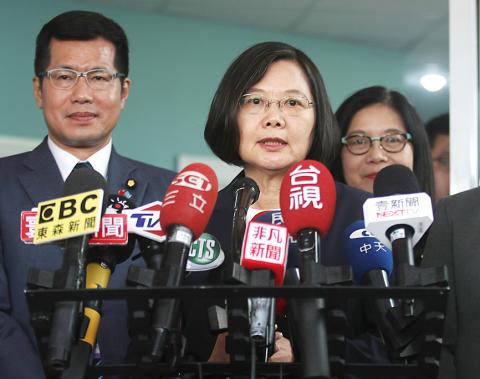Taiwan would handle the issue of Hong Kong residents arriving in the nation to seek political asylum “appropriately based on humanitarian considerations,” President Tsai Ing-wen (蔡英文) said.
Tsai, who is on a state visit to Taiwan’s Caribbean allies, made the remark when asked about a report by Radio Free Asia on Thursday that about 10 Hong Kong protesters have arrived in Taiwan to seek political asylum since the storming of the Hong Kong Legislative Council building on July 1 following a series of demonstrations against a bill that would allow people to be extradited to China.
The individuals have been given shelter by non-governmental organizations, the report said.

Photo: CNA
A Taiwanese lawyer who helps Hong Kong residents come to Taiwan told the broadcaster that they have encountered technical difficulties when seeking to extend their stay in the nation.
Meanwhile, Hong Kong’s Apple Daily, citing unidentified sources, yesterday reported that about 30 protesters have already arrived in Taiwan to seek asylum, while as many as 30 others — and possibly more — are planning to try soon.
The Mainland Affairs Council would not confirm whether there are people from Hong Kong seeking political asylum, saying only that it has seen an increase in the number of Hong Kongers inquiring about residency in Taiwan.
The council on Thursday said that if Taiwan receives applications from Hong Kong residents for political asylum, government agencies would handle each case in accordance with the law based on the principle of protecting human rights.
The government deals with visits or residency of Hong Kong citizens in accordance with the Act Governing Relations with Hong Kong and Macau (香港澳門關係條例), the council said, adding that it would provide assistance to Hong Kong citizens whose safety and freedom are threatened due to political factors.
The National Immigration Agency yesterday said it has not received any applications for political asylum from Hong Kongers.
The Taiwan Association for Human Rights would not comment on the issue.
“We cannot divulge any information regarding any individual case,” association secretary-general Chiu Ee-ling (邱伊翎) said. “If there are individuals who approach us for help, we’ll interview these people and help them get in touch with government officials if that is what they wish.”

INVESTIGATION: The case is the latest instance of a DPP figure being implicated in an espionage network accused of allegedly leaking information to Chinese intelligence Democratic Progressive Party (DPP) member Ho Jen-chieh (何仁傑) was detained and held incommunicado yesterday on suspicion of spying for China during his tenure as assistant to then-minister of foreign affairs Joseph Wu (吳釗燮). The Taipei District Prosecutors’ Office said Ho was implicated during its investigation into alleged spying activities by former Presidential Office consultant Wu Shang-yu (吳尚雨). Prosecutors said there is reason to believe Ho breached the National Security Act (國家安全法) by leaking classified Ministry of Foreign Affairs information to Chinese intelligence. Following interrogation, prosecutors petitioned the Taipei District Court to detain Ho, citing concerns over potential collusion or tampering of evidence. The

Seventy percent of middle and elementary schools now conduct English classes entirely in English, the Ministry of Education said, as it encourages schools nationwide to adopt this practice Minister of Education (MOE) Cheng Ying-yao (鄭英耀) is scheduled to present a report on the government’s bilingual education policy to the Legislative Yuan’s Education and Culture Committee today. The report would outline strategies aimed at expanding access to education, reducing regional disparities and improving talent cultivation. Implementation of bilingual education policies has varied across local governments, occasionally drawing public criticism. For example, some schools have required teachers of non-English subjects to pass English proficiency

‘FORM OF PROTEST’: The German Institute Taipei said it was ‘shocked’ to see Nazi symbolism used in connection with political aims as it condemned the incident Sung Chien-liang (宋建樑), who led efforts to recall Democratic Progressive Party (DPP) Legislator Lee Kun-cheng (李坤城), was released on bail of NT$80,000 yesterday amid an outcry over a Nazi armband he wore to questioning the night before. Sung arrived at the New Taipei City District Prosecutors’ Office for questioning in a recall petition forgery case on Tuesday night wearing a red armband bearing a swastika, carrying a copy of Adolf Hitler’s Mein Kampf and giving a Nazi salute. Sung left the building at 1:15am without the armband and apparently covering the book with a coat. This is a serious international scandal and Chinese

NEGOTIATIONS: The US response to the countermeasures and plans Taiwan presented has been positive, including boosting procurement and investment, the president said Taiwan is included in the first group for trade negotiations with the US, President William Lai (賴清德) said yesterday, as he seeks to shield Taiwanese exporters from a 32 percent tariff. In Washington, US Trade Representative Jamieson Greer said in an interview on Fox News on Thursday that he would speak to his Taiwanese and Israeli counterparts yesterday about tariffs after holding a long discussion with the Vietnamese earlier. US President Donald Trump on Wednesday postponed punishing levies on multiple trade partners, including Taiwan, for three months after trillions of US dollars were wiped off global markets. He has maintained a 10 percent